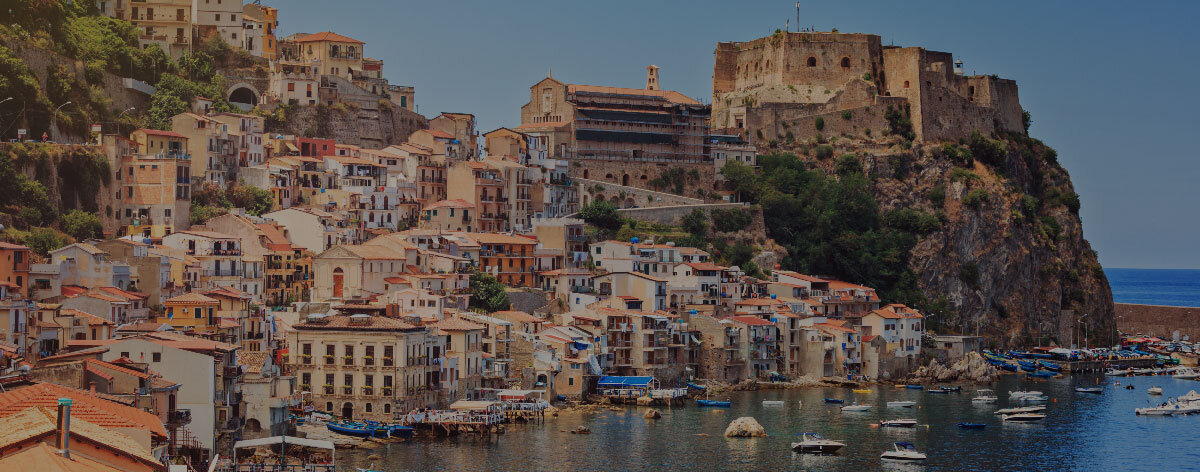Scilla and the spectacular sea landscape in Chianalea
The town of Scilla is one of the best places to visit in Calabria.
If you see the village from higher hills, or from the sea, Scilla is characterized by an imposing promontory (a huge rock) in the Tyrrhenian Sea.
This big rock divides the coast into two areas: Marina Grande and Chianalea.
The beach of Marina Grande going to the south-west; the fascinating series of houses in Chianalea going to north-east.
Chianalea “caressed” by the sea is one thing you must see in your holiday in Calabria.
On top of the rock you find the old castle, Ruffo family’s property between the ‘500 and the first decade of the ‘800.
We are a few miles far from the Strait of Messina.
The swordfish in Costa Viola:
fishing and cooking
According to some influencers Scilla is the best Calabrian cuisine of swordfish.
Hunting swordfish is one of the top things to see in Costa Viola.
The expert local seamen are specialized in the capture of Xiphias gladius, which is hunted using boats called “spadare”.
Some spadare are equipped to host tourists on board. Exciting experience.
Scilla, the Odyssey mith and the Ovid’s fantastic tales
Scilla is more than a symbolic place of Calabria, more than a postcard-like landscape.
Scilla actually seems to have an eternal vitality that comes from the myth that has always accompanied it. It’s the great story told by Homer in the Odyssey, but also by other formidable authors, such as Ovid in the Metamorphoses.
We’re going to tell you about it.
A Core Calabro’s tour is the best thing to do if you want to know nuances and variants of the story, that can alter it.
The love affair of Glauco and Scilla
Glauco was a fisherman from Boeotia (ancient Greece), whose mortal destiny changed when he tasted a miraculous herb. He saw that the freshly fish he caught, in contact with a particular grass, prodigiously came back to life. Then he got curious, he wanted to taste those green tufts that sprouted from the sand and he found himself, in a short time, overwhelmed by the irrepressible instinct to dive in the water of the sea.
He was undergoing a mutation!! The sea had become his living space, his body was physically transformed, his lower limbs became a fish tail, large arms with blue reflections and a beard looking like the algae of the seabed took shape. He had become a sea god.
Swimming in the Mediterranean, one day Glauco was attracted by a beautiful girl, who spent much of her time on the beach (several texts talk about Messina shoreline). It was Scilla (in the Homeric poem she is considered the daughter of a goddess named Crataiis).
She was a shy girl, so she refused many amorous pretenders, it seemed that only the sea was her delight. While she was taking a bath, Glauco surprised her and scared her a lot.
He was in love and begged her with sweet words to seduce her.
There was no way. Scilla declined the invitation.
Scilla’s mutation
Glauco was also willing to cheat, so as to bewitch the girl’s heart, then he turned to the sorceress Circe for a magic potion. But the diabolical Circe fell in love with Glauco, and offered himself to him.
However, Glauco was steadfast to persuade Scilla, and expressed a sharp rejection to Circe.
The sorceress put on a cruel revenge: she prepared an evil concoction which she poured into the waters where Scilla used to bathe.
One day Scilla plunged and, in a very short time, she saw the world changing around her: from the hips down her body was now possessed by six monstrous heads of snarling dogs, devourers of everything nearby.
Ulysses’ episode
Scilla and Cariddi
Ulysses saw the horrible death of his companions slaughtered by Scilla.
According to legend Scilla had then gone to take refuge in a dark cave on the opposite bank to Messina, a cave from which people used to hear fearful barks.
From there these monsters attacked the sailors, who were often ferociously torn to pieces by the creature with six heads of rabid dogs.
The mythology offers sci-fi plots to justify the real dangers of crossing the Strait in which the changes of direction of the sea currents, and the storms, caused many discomforts and shipwrecks.
The myth also includes another “monster” opposite to Scilla: that’s the vortex that swallowed ships and men, it was called Charybdis (Cariddi), Ulysses himself had to escape with cunning and courage.

